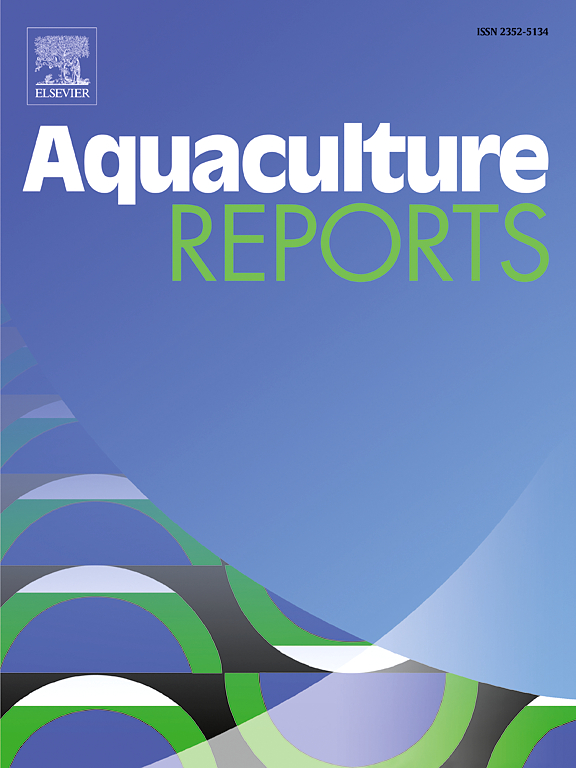Effects of dietary curcumin supplementation on growth performance, antioxidant capacity, and gene transcriptome in the juvenile Manila clam (Ruditapes philippinarum)
IF 3.7
2区 农林科学
Q1 FISHERIES
引用次数: 0
Abstract
The complex conditions in aquaculture environments often lead to oxidative stress in juvenile bivalves, highlighting the need for effective mitigation strategies. This study evaluated the effects of dietary curcumin supplementation on growth performance, antioxidant capacity, and gene transcriptome in the juvenile clam (Ruditapes philippinarum). A total of 36 g of clams (individual body weight: 0.5 ± 0.17 mg, shell length: 1.15 ± 0.15 mm) were equally distributed into six groups (three replicates per group) and fed six microencapsulated diets containing 0, 50, 100, 200, 400, and 800 mg/kg of curcumin for three weeks. Results indicated that curcumin supplementation did not significantly influence growth performance. However, clams in the 200 mg/kg and 400 mg/kg groups exhibited markedly higher activities of catalase, superoxide dismutase (SOD), and glutathione, along with reduced malondialdehyde (MDA) levels compared to the 0 mg/kg group. Following treatment with hydrogen peroxide, the survival rate of clams in 400 mg/kg group was significantly higher than 0 mg/kg group. Meanwhile, the activities of SOD and Glutathione Peroxidase were significantly increased in the 400 mg/kg group, with a corresponding reduction in MDA levels compared to the 0 mg/kg group. The transcriptome analysis further revealed that supplementation with 400 mg/kg curcumin significantly upregulated the expression of genes related to autophagy and lysosomal pathways when compared to the 0 mg/kg group. In conclusion, our study suggested that supplementation with 400 mg/kg curcumin significantly enhanced the antioxidant capacity of clams, providing essential insights for mitigating oxidative stress in juvenile bivalve aquaculture.
饲料中添加姜黄素对马尼拉蛤幼鱼生长性能、抗氧化能力和基因转录组的影响
水产养殖环境的复杂条件往往导致双壳类幼体氧化应激,因此需要有效的缓解策略。本研究评估了饲料中添加姜黄素对菲律宾蛤幼鱼生长性能、抗氧化能力和基因转录组的影响。选取36 g单体重0.5 ± 0.17 mg,壳长1.15 ± 0.15 mm的蛤蜊,随机分为6组(每组3个重复),分别饲喂姜黄素含量为0、50、100、200、400和800 mg/kg的微胶囊饲料,饲喂3周。结果表明,添加姜黄素对生长性能没有显著影响。然而,与0 mg/kg组相比,200 mg/kg和400 mg/kg组蛤蜊的过氧化氢酶、超氧化物歧化酶(SOD)和谷胱甘肽活性显著提高,丙二醛(MDA)水平显著降低。过氧化氢处理后,400 mg/kg组蛤蜊存活率显著高于0 mg/kg组。与0 mg/kg组相比,400 mg/kg组SOD和谷胱甘肽过氧化物酶活性显著升高,MDA水平相应降低。转录组分析进一步显示,与添加0 mg/kg姜黄素组相比,添加400 mg/kg姜黄素显著上调了自噬和溶酶体途径相关基因的表达。综上所述,在饲料中添加400 mg/kg姜黄素可显著提高对虾的抗氧化能力,为缓解双壳类幼体的氧化应激提供了重要的理论依据。
本文章由计算机程序翻译,如有差异,请以英文原文为准。
求助全文
约1分钟内获得全文
求助全文
来源期刊

Aquaculture Reports
Agricultural and Biological Sciences-Animal Science and Zoology
CiteScore
5.90
自引率
8.10%
发文量
469
审稿时长
77 days
期刊介绍:
Aquaculture Reports will publish original research papers and reviews documenting outstanding science with a regional context and focus, answering the need for high quality information on novel species, systems and regions in emerging areas of aquaculture research and development, such as integrated multi-trophic aquaculture, urban aquaculture, ornamental, unfed aquaculture, offshore aquaculture and others. Papers having industry research as priority and encompassing product development research or current industry practice are encouraged.
 求助内容:
求助内容: 应助结果提醒方式:
应助结果提醒方式:


